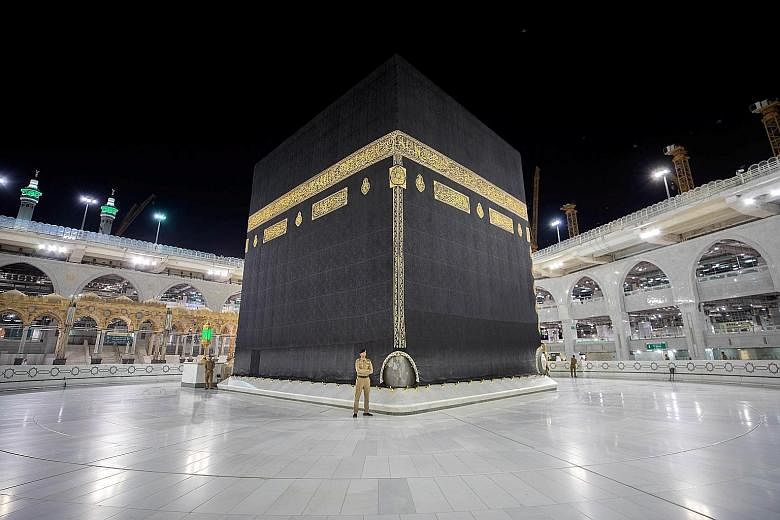Singaporean pilgrims will have to defer their annual haj pilgrimage to Mecca to next year due to the Covid-19 pandemic, said the Islamic Religious Council of Singapore (Muis) yesterday.
The Fatwa Committee, a group of senior religious scholars that issues religious rulings and guidance, has also met to discuss the matter and supports the deferment for reasons of health and safety, Muis added.
The annual haj pilgrimage to the holy city of Mecca, slated to begin in late July, is one of the world's largest religious gatherings. Last year, about 2.5 million Muslims from around the world travelled to Saudi Arabia for it.
The 900 people from Singapore who have registered to perform haj this year will now be automatically rescheduled to do so next year.
It is still unclear whether the Saudi authorities will allow the haj to take place this year. Saudi Arabia has yet to make an official announcement.
In a statement, Muis said that the council has full confidence in Saudi Arabia's management of the pandemic. But Singapore has its own considerations to safeguard its pilgrims' health and well-being.
Minister-in-charge of Muslim Affairs Masagos Zulkifli told a virtual press conference yesterday that the decision to defer the haj was made independently of the Saudi authorities, "out of consideration for the needs of our pilgrims, and the safety of our pilgrims, in the context that serves Singapore best".
With Singapore's healthcare resources fully committed to managing Covid-19 and other pressing hospital requirements, it is unable to assemble a team of doctors and nurses to support this year's haj delegation, Muis said.
"While we want to help our Muslim community to fulfil their pilgrimage, we also have a responsibility to protect the pilgrims and their families, as well as the wider community in Singapore, from the risk of infection," it added.
The council also noted that more than 80 per cent of Singaporeans scheduled to perform haj this year are above the age of 50 - placing them at greater risk of complications and dying if they contract the coronavirus.
"In addition, younger pilgrims who are working have expressed challenges in obtaining leave to perform the haj and concerns over their job security, given the challenging economic situation. This is compounded by the fact that Singaporean travellers must serve a 14-day stay-home notice upon their return to Singapore."
The haj is one of the five pillars of Islam. Muslims are obliged to go on the pilgrimage at least once in their lifetime, if they have the means to do so and the journey is safe for them.
Under the present circumstances, however, not all the conditions for a safe haj are met, according to Muis' Fatwa Committee of top religious scholars who had convened earlier to discuss the matter.
Muis also consulted the Association of Muslim Travel Agents (Amtas) Taskforce on the welfare, health and safety of pilgrims, and Amtas fully supports the decision to defer the haj, said president T.M. Fouzy.
In March, the Saudi Haj Ministry issued an advisory to haj agencies around the world to stop taking on new reservations or payments with respect to the pilgrimage in 2020.
The Ministry of Health's director of medical services Kenneth Mak, who was also present at yesterday's press conference, said that in Saudi Arabia, the risk posed by Covid-19 is "considered high for widespread and sustained community transmission". The kingdom has reported over 46,000 cases of Covid-19.
Associate Professor Mak added that people who undertake the haj come from many different countries, and some of the countries that sent a high number of pilgrims in the past are currently high-risk areas for Covid-19.
Mufti Nazirudin Mohd Nasir, Singapore's highest Islamic authority, said: "The good news for pilgrims is patience in itself - waiting for a safer time to go on haj - is a very important form of worship in Islam with the greatest rewards.
"So, when our prospective pilgrims have made the intention to perform haj, but could not do so, specifically because of circumstances beyond their control, like the spread of the virus, their noble intention is recorded as an act."
Affected pilgrims will receive letters from Muis with more details. They can also contact their respective haj general service agents or call Muis' hotline on 6350-5369.












